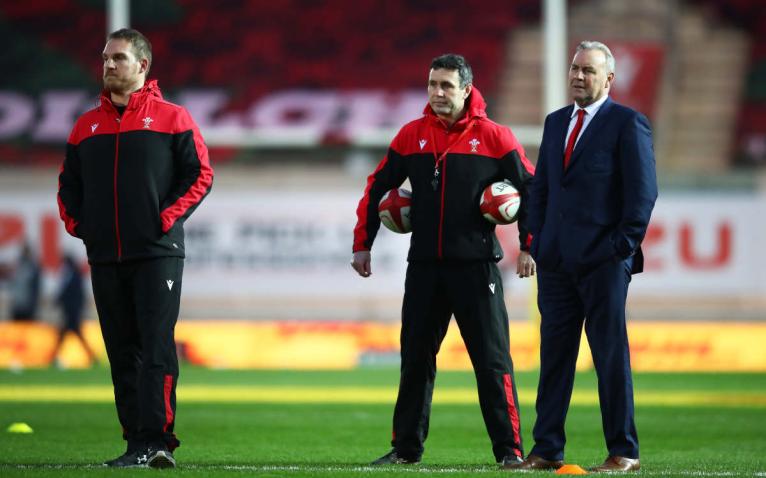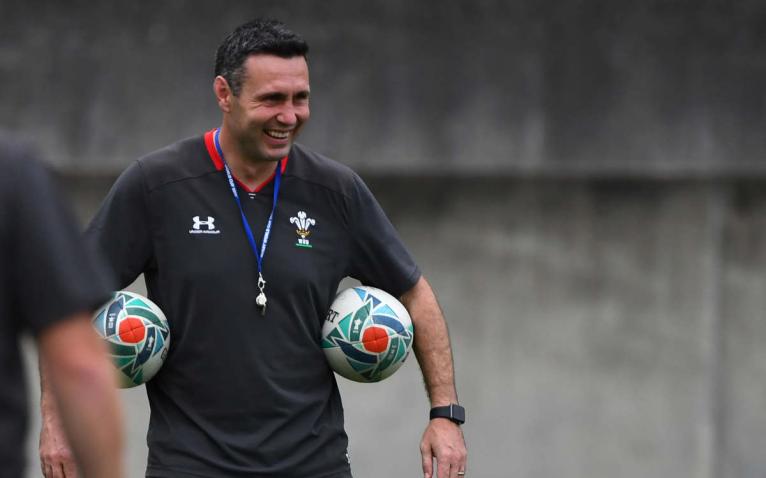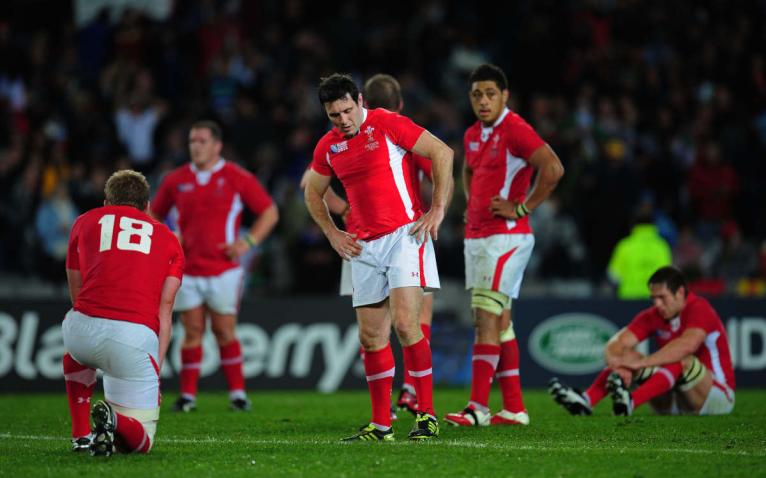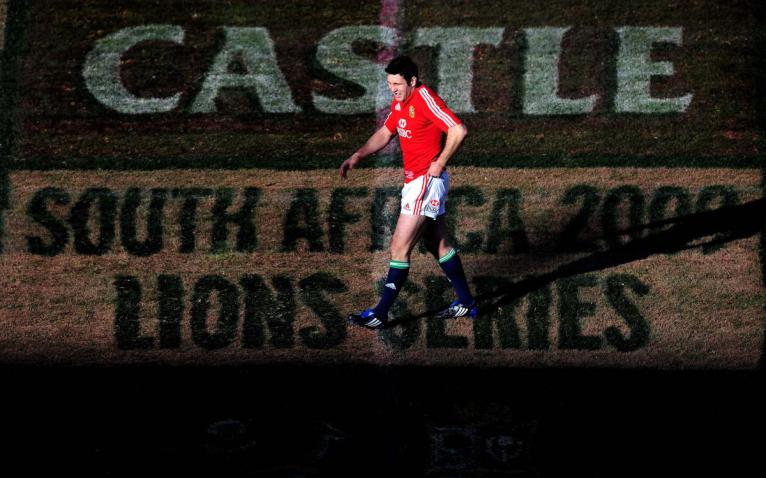Test match rugby, says the former Wales rugby captain Stephen Jones in his autobiography, is like a drug, “and the positive experiences always outweigh the negative ones”.
How does Jones feel more than a decade after those words were written?
Does the affable ex-Scarlet still feel the same about the international scene?
He could be forgiven for having changed his mind.
A three-year spell as part of the Wales coaching team ended in late December last year when a reshuffle by Warren Gatland, who had returned to start his second stint as Wales team boss just weeks earlier, saw attack coach Jones and his former Test team-mate Gethin Jenkins depart from the set-up.
The irony was that Wales had played some of their best attacking rugby in years in their previous game, scoring four tries against Australia in Cardiff. An individual who’d fallen into a deep and prolonged sleep 55 minutes into the match in Cardiff might have woken last week wondering if head coach Wayne Pivac and Jones had managed to build on those encouraging moments and asked what kind of shape Wales were in under their charge heading for the World Cup.
But, of course, Wales unravelled spectacularly in the final quarter against the Wallabies amid injuries, yellow cards and three opposition touchdowns, including a penalty try. Everything that could go wrong did go wrong. There were 26 unanswered points from the visitors as the hosts saw a 21-point lead wiped out in the time it takes to watch an old episode of the TV sitcom Frasier. The look on Pivac’s face at the end suggested he knew the game was up for him as head coach, and so it proved.

Gatland subsequently moved to bring in his own men, the way of the world in coaching, but some felt Wales had erred in parting company with Jones, in particular. “Stephen was an excellent young coach when he took the Wales job, and he’s probably an even better coach today,” one Welsh rugby insider told this writer. “He’s gained insights and experiences from his time in the set-up, adding to the knowledge he had before he started. Wales have let go of someone with a lot of talent.”
But Jones himself is not one for looking back in anger. Never has been.
Nor is he one to make a habit of airing his feelings.
Social media maybe for some more vocal types, but self-justification and arguing with people he doesn’t know is not remotely in the ex-fly-half’s playbook.
Since leaving the Wales scene, he has quietly got on with his life, spending time with his family while continuing to add to his bank of professional knowledge.
There is no negativity about his time with Wales. “The opportunity was a brilliant one, “ he says when we speak.
You are conscious that you don’t have much grass time. It’s not long to bring people together and do what you want to do with them as a team.
“You are coaching your country and dealing with elite players and that is special.
“The big difference between coaching on the regional scene and with Wales is that you have such limited actual coaching time at international level. That was the big learning curve.
“You might have your philosophy of how you want to play, but that’s only a starting point. You want to upskill people and evolve a way of playing, but you are also conscious that you don’t have much grass time. It’s not long to bring people together and do what you want to do with them as a team.
“In the autumn, for example, you inherit the boys two weeks before your first game – perhaps against New Zealand. In that fortnight, you’d lose your exiled players, who’d go back and play for their clubs across the border.
“And regions and club teams all have their own playing styles.

“Every international coach will tell you the best time is just before the World Cup when you have a pre-season with the players. That is brilliant – two or three months to get the guys playing in a style and manner that you want.
“For other periods, there are not many minutes when you are out on the field with the boys.
“But that’s the deal and it’s the same for everyone.
“When I look back at my time with Wales, there were positives.
“We won the Six Nations title with a record number of tries, we scored a record number of points against England and, ironically, in the last game we scored a record number of points by a Wales team against Australia. We also won a Test against the Springboks in South Africa for the first time.
Of course, you’d want certain things to have gone better, but difficult periods are when the best learning takes place.
“We also played some of our best rugby in the game with Australia. So that was the last bit of coaching in that phase of my career. The match went away from us, but that’s how it is.
“I’m just grateful to have had the chance to coach my country.
“Of course, you’d want certain things to have gone better, but difficult periods are when the best learning takes place.”
In 27 years in professional rugby – he made his Llanelli debut as an 18-year-old against Maesteg at the Old Parish in 1996, after which he was handed the princely sum of £25 in a brown envelope by the club’s then team manager Anthony Buchanan – Jones has unfailingly made a point of looking on the bright side.
At times, that’s just as well.
His first Test appearance, off the bench, came in Wales’s 96-13 record defeat by South Africa in Pretoria in 1998. He was around, too, during the oft-difficult years that followed, when Wales struggled to make consistent headway.

Then there was the pool-stage exit from the 2007 World Cup.
Interspersed with the clouds were extended times in the sun, with Jones helping Wales to Grand Slams in 2005 and 2008 and being picked as the Lions’ first-choice Test fly-half in 2005 and 2009. There was success with the Scarlets and with Clermont Auvergne, with Jones voted the best fly-half in the Top 14 by the Midi Olympique magazine after his first season in France.
But the highs and lows haven’t changed him, nor has his time as a coach.
He has a reputation as one of rugby’s nice guys, with Scarlets rugby historian Les Williams saying: “If I had a daughter, Stephen would be someone I’d like to see as her boyfriend. He’s a gentleman who can never do enough for others.”
He may not do many media interviews, but he could not be more accommodating when the request for a chat is put in to him and he is ready and waiting for a call when I ring at the agreed time, starting our discussion by asking about my family.
The chat soon turns to what he has been doing with himself these past seven or so eight months. Quite a lot, it turns out.
“I’ve enjoyed it,” he says.
“There’s been a lot of family time, and with three young kids, that’s important to me, mixed in with some professional development. I’ve been able to get out and meet people from different sports and businesses, including a guy who’d been head of performance for four Premier League football clubs.
The game evolves every year – tactics change, standards improve – so you have to be better every year. You have to learn about improving from within but you can’t be so insular that you are afraid to look outside.
“There’s a lot of crossover with sports like football. You learn how teams go about recruitment, how their academy operations run, so that when players come up through the pathway everything’s aligned and the transition is a lot easier. I’ve tried to learn from good people.
“You might meet culture and sport experts and discuss a range of things, including how you create a good environment, how you facilitate and how you challenge yourself and your players in a productive manner. It’s been about opening my mind and developing my appreciation of what makes elite and high-performing teams the best.
“But I’ve also wanted to make the most of the opportunities that have come my way, because it’s important to learn and reflect.”
As part of the process, Jones spent time in New Zealand with the Warriors rugby league team and the Blues union side, both of whom welcomed him with open arms: “They were great – so warm and inclusive, even allowing me to sit in on meetings. I was able to see how they function and how they drive standards.
“I found the visit really useful. The game evolves every year – tactics change, standards improve – so you have to be better every year. You have to learn about improving from within but you can’t be so insular that you are afraid to look outside.”

Jones has had job offers since his exit from the Wales coaching team but so far he has resisted the chance to take any of them up. “I have been fortunate to have had some interest, but I’m still mulling through things,” he says. “I want something that works, fits and excites me – a project where I know I can make a big difference. That’s why I’ve avoided jumping back in.
“My thinking is that a coach has to coach with enthusiasm and enjoyment, otherwise players won’t respond as you’d want them to respond. When you were in school, your favourite subject was probably the one with the most enthusiastic teacher or the person you had the best relationship with.
“If you’re enjoying coaching, have energy and drive and are determined to make people better, and there’s buy-in from players, you are on your way,
“I’ll just take some time now and see what’s out there.”
We have some crackers in Wales. I think, as coaches, we have a duty to be the best we can possibly be to give the youngsters the rugby education they deserve and allow them to fulfil their potential.
Jones does not subscribe to the view that Welsh rugby is in Old Mother Hubbard territory when it comes to emerging talent. During his time on the national coaching panel, Jac Morgan and Tommy Reffell – “super talents”, according to Jones – were introduced to the Test scene, along with the likes of Louis Rees-Zammit, Dewi Lake, Dafydd Jenkins, Christ Tshiunza, Mason Grady, Rio Dyer and others.
“We have some crackers in Wales,” he says. “I just think, as coaches, we have a duty to be the best we can possibly be to give the youngsters the rugby education they deserve and allow them to fulfil their potential.”
There are no regrets, then, over his Wales experience? “No,” he says. “Of course, you reflect and think if this or that situation arises again, you can learn from the experience and maybe do certain things slightly differently.
“Whatever job you’re in, that’s how you evolve, but I’m one for looking forward.”
Careers are not straight lines, particularly in sport. Fortunes ebb and flow, but Jones is right to suggest that challenging periods are when high-achievers are truly made.
When he does return to the rugby front-line, some team or other is going to have a coach determined to make a difference, and one blessed with the talent and knowledge to back up that ambition.
Watch this space? That sounds about right.



Comments
Join free and tell us what you really think!
Sign up for free